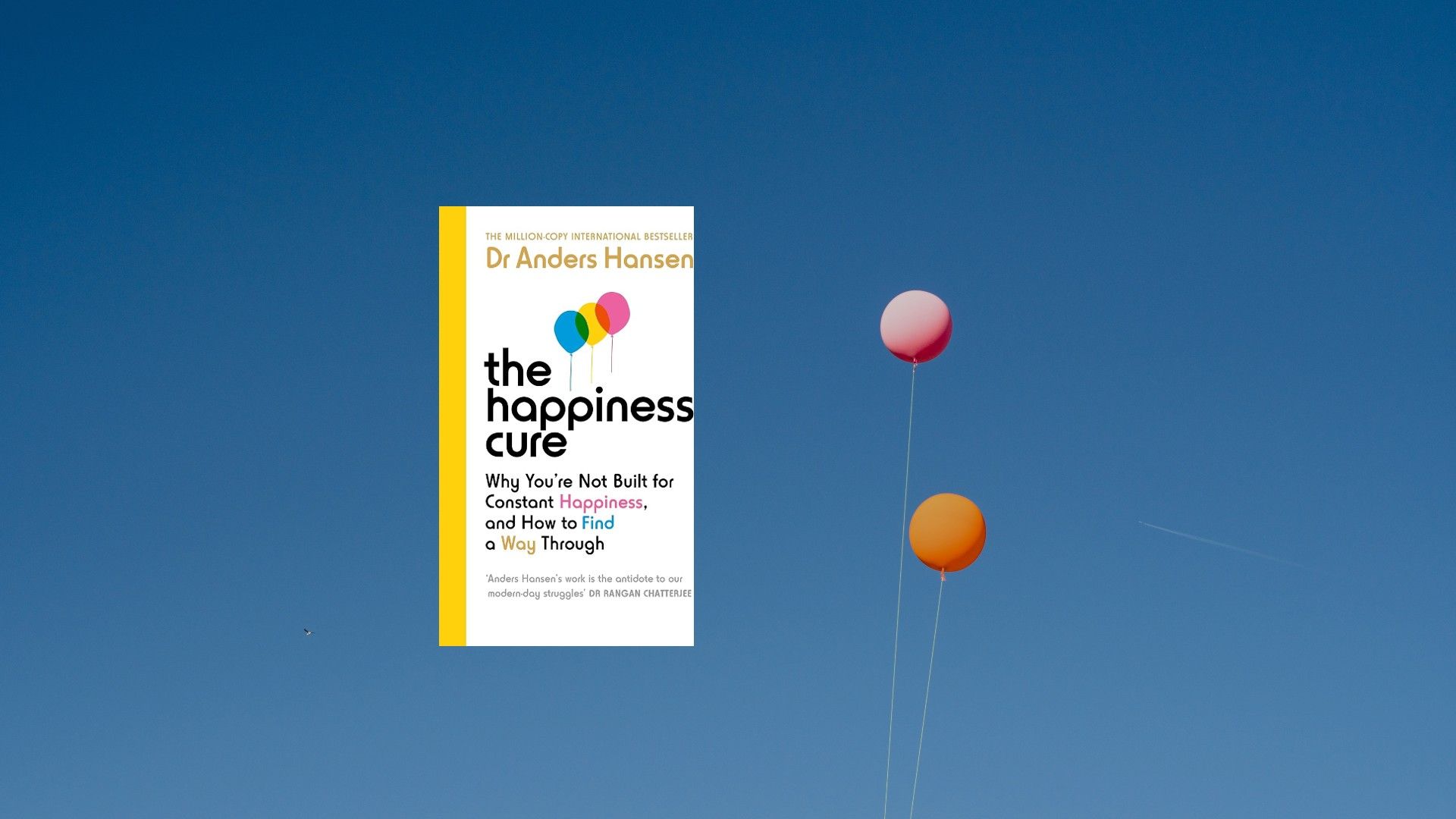The Happiness Cure - Book Summary

Why You're Not Built for Constant Happiness, and How to Find a Way Through
by Dr Anders Hansen
"Anders Hansen's work is the antidote to our modern-day struggles."
― Dr Rangan Chatterjee
"A brilliantly researched book that will transform how you think about happiness"
– Thomas Erokson (Author of Surrounded by Idiots)

Ch 1 - We Are The Survivors!
In this chapter, we find out that our brain is designed to protect us, (to survive and reproduce) and not to make us happy.
Life expectancy at birth before < 1800 BCE, was around 33 years, from 1800-1990 was 35 to 77 years and after > 1990 around 82 years (Europe, 2020).
Our brain hasn't had a major change since 10, 000 ~ 20,000 years ago, this explains our behaviour and feelings when it comes to anxiety and stress.
Ch 2 - Why Do We Have Feelings?
"In essence, feelings have just one purpose: to affect our behaviour and, in doing so, to help us survive so that we can procreate."
Expecting to always feel great is about as unrealistic as expecting a banana to keep us full for the rest of our lives.
Ch 3 - Anxiety And Panic
"I've lived through some terrible things in my life, some of which actually happened." – Mark Twain
By default, our brain sees what's wrong, and remembers the bad stuff much faster than the good ones.
Our perception can alter our experience and memory of an action. And to heal, it helps to recall the memory in a safe environment. ( Node from myself: You checking EMDR therapy)
Anxiety aid:
1) Breath (4 in 6 out)
the autonomic nervous system consists of two distinct parts
– the sympathetic nervous system linked to flight or fight response
– the parasympathetic nervous system associated with digestion and rest.
Breathing influences the dynamic interaction between them.
2) Write
When we describe how we feel the lateral part of the frontal lobe - the part that focuses on surroundings - is activated. This activity attenuates the amygdala's activity.
Ch 4 - Depression
Inflammation is one of the major causes of depression.
Our bodies and brains have evolved based on the young people rather than the old ones. For example, if our young ancestors had disease A and the elderly ones had disease B, the young individuals who survived disease A and went on to procreate would pass on their genes, while the older individuals who did not have children would not.
Stress and depression are to protect ourselves. "Psychiatrist Charles Raison believes that, throughout most of human history, stress has been a reliable signal to the body of an increased risk of infection."
In the past, our ancestors went hunting or participated in other activities that exposed them to injuries, some of which could lead to infections and, in some cases, even death. When our body has an infection stress appears and this stress lasting months or years leads to depression(a feeling that makes us withdrawn and mentally stand still )because the body is trying to protect us by not doing activities that expose us to more injuries or infections.
Cytokines - send the infection signals to the brain.
A study by Danish researchers found that having a high level of CRP - C-reactive protein made people have mild depression, fatigue and low self-esteem.
The initial body causes of inflammation were: bacteria, viruses and injuries - and they were often temporary. But in today's world, we add to those also a sedentary lifestyle, obesity, stress, junk food, smoking and environmental toxins that tend to last longer.
Reading this I understand that for example sedentarism causes inflammation that causes stress and the body's solution is to make us drepressive which leads to more sedentarism. This shows us that the body didn't evolve with the modern world problems and we have to take the matter into our own hands and take the appropriate action, start exercising.
"Inflammation sustained over a long period of time can cause health attacks, stroke, rheumatism, diabetes, Parkinson's disease and Alzheimer's disease ..."
Ch 5 - Loneliness
"Loneliness is the difference between how much social interaction we have and how much we would like to have."
Long-term loneliness makes people perceive neutral facial expressions as more threatening, and perceive people around them as competitive and unhelpful; acquaintances start to feel like strangers.
Usually, we're at our happiest when we're with others. Social bonding, back in the day, was key to our ancestor's survival. When we are in groups and feel that we belong, the brain helps us relax more since there is less threat in a group. Social interactions are good for our health and happiness and without it, we tend to live a shorter life.
One study showed that even 10 minutes a call, a few times per week, for 4 weeks lowered the participant's score of 'loneliness' by 20%.
The ones who made the call were young people who had to be empathetic, listen and make small talk with the participants.
Ch 6 - Exercise
I noticed that the exercise topic is found in most of the mental health books. And this book is no exception.
There was a study that looked at physical strength and depression, and the conclusion was that for those who were physically fit the risk of depression was lower.
HPA axis - body central system. "The hypothalamus sends signals to the pituitary gland at the base of the brain, which in turn sends signals to the adrenal glands.
The adrenal glands then secrete the hormone cortisol, which mobilises energy."
For example, cortisol rises in the morning to give us energy to get out of bed, but it also rises if we are stressed.
An overactive HPA is calmed by physical activity but in the long term improves its ability to stop itself from becoming more sensitive. In the short term, exercise particularly high-intensive training, stimulates HPA since it's a stress for the body.
"So, when you go run, the cortisol levels in your blood rise, but after the run, they drop to lower levels than before and remain there for up to a few hours."
The hippocampus and frontal lobe are strengthened by physical activity. The hippocampus gets bigger and in the frontal lobe, new small blood vessels are formed.
"Exercise increases levels of dopamine, serotonin and noradrenaline, and also of BDNF" (which plays an important role in neuronal survival and growth, serves as a neurotransmitter modulator, and participates in neuronal plasticity, which is essential for learning and memory.) and in time help reduce the inflammation.
If you run for 15 minutes or walk for 1 hour daily it helps reduce depression by 26%.
How little exercise is needed against depression?
- 1 h of power walk/week does some protection.
Most studies show that 2h - 6h of cardiovascular exercise/week is optimal. More than 6 hours of exercise per week appears to offer no additional protection.
...
Ch 8 - The Destiny Instinct
Some studies show that when labelling people, they start to behave that way. For example, when some people were told they carry genes for alcoholism( which was false information), found it harder to cut alcohol consumption vs the control group.
And as an advice that the book offers: you are not your diagnosis!
"In my work I have occasionally seen a psychiatric diagnosis become that story. Certain people identify with their diagnosis and start to see themselves as 'the sick person'. This is a shame because such identities are not just a way for the brain to make sense of our past, they become roadmaps for our future." - triggers the destiny instinct.
"Just because you feel a lot of anxiety in one period of your life, it doesn't mean you will always feel that way."
Ch 9 - The Happiness Trap
In research, happiness is defined as how satisfied we are with the direction our life has taken, "is seen as a long-term sense of purpose then constantly feeling great".
A tip that I found here is that: we should not think about happiness and we should have low expectations.
Expecting to feel great all the time will lead to disappointment.
One important rule: if you feel mentally unwell, you should seek help!
We seek help when something hurts in our body and this should be no different.
DISCLAIMER*
Internet should not be a therapy replacement. If you feel unwell please contact your doctor.
Samaritans - 116 123
Mind - 0300 123 3393
Anxiety UK - 03444 775 774
NHS - 111
Note: Some pieces of information are left out of the book.
Get the full experience by reading it! ❤
